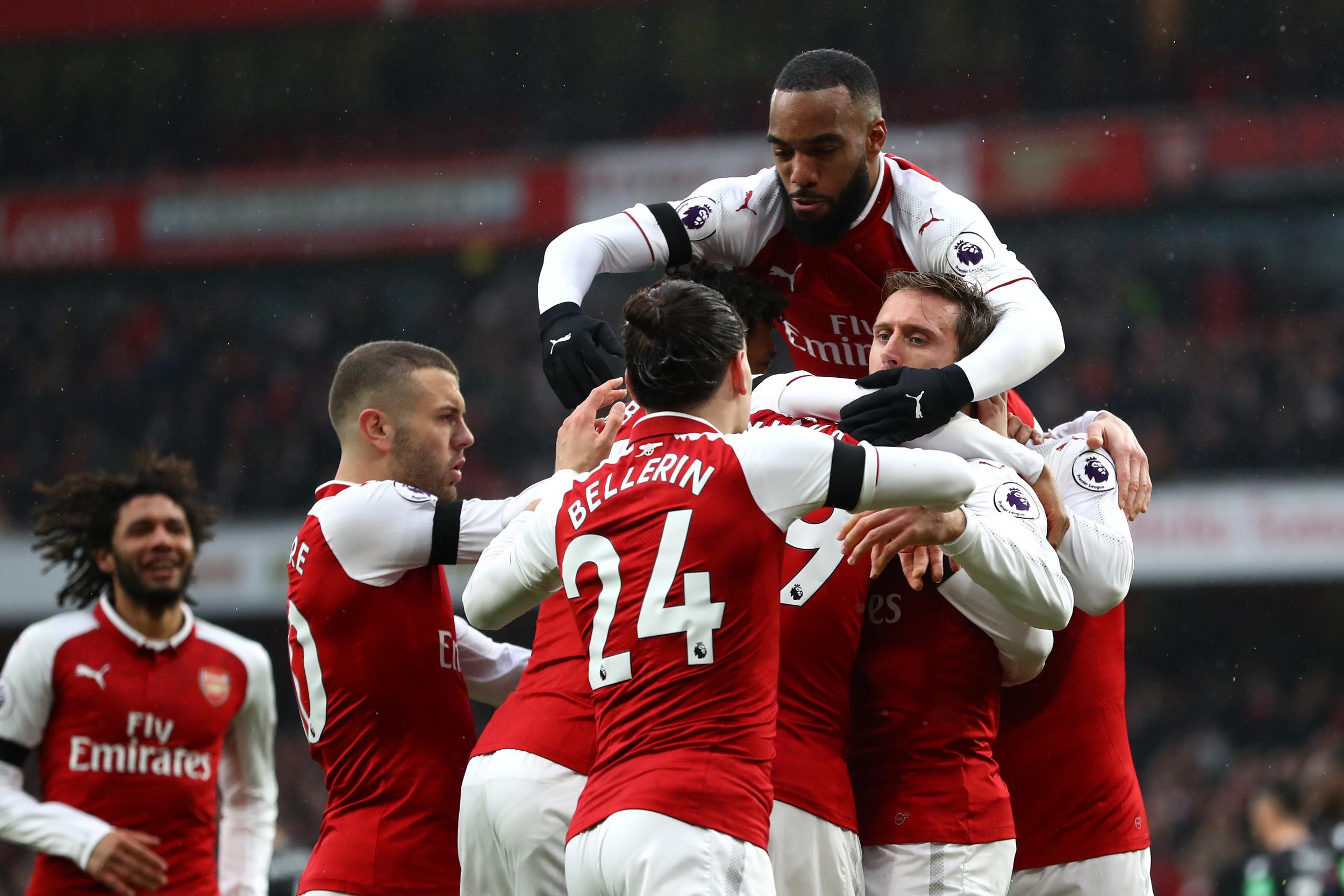Why Alexis Sanchez leaving might open a window for Arsenal to rediscover their identity
That Sanchez has left may just restore some of the balance and harmony that has characterised Arsene Wenger’s best Arsenal sides

Your support helps us to tell the story
From reproductive rights to climate change to Big Tech, The Independent is on the ground when the story is developing. Whether it's investigating the financials of Elon Musk's pro-Trump PAC or producing our latest documentary, 'The A Word', which shines a light on the American women fighting for reproductive rights, we know how important it is to parse out the facts from the messaging.
At such a critical moment in US history, we need reporters on the ground. Your donation allows us to keep sending journalists to speak to both sides of the story.
The Independent is trusted by Americans across the entire political spectrum. And unlike many other quality news outlets, we choose not to lock Americans out of our reporting and analysis with paywalls. We believe quality journalism should be available to everyone, paid for by those who can afford it.
Your support makes all the difference.Where a door closes, a window opens. It may not always be the most auspicious of situations – especially if you’re trying to move heavy furniture out of the house – but as Arsenal accustom themselves to the Alexis Sanchez-shaped void in their squad, they will be clinging to that little morsel of wisdom, in the hope that the departure of their star player can prove an opportunity as much as a burden.
Arsene Wenger put it as eloquently as ever. “There is always life,” he said, with the sort of evangelical zeal that has seen him through the good times, the bad times and the worse times. “Arsenal Football Club is 130 years old. Many big players have left. Will it go a bit less well? We will see. But there is always life.”
Wenger was, of course, speaking from a position of modest strength. Arsenal had just torn apart Crystal Palace 4-1, and even though Roy Hodgson’s side rallied in the last hour, Arsenal’s operatic start to the game offered just the briefest of glimpses of what a post-Sanchez future might look like.
As Arsenal poured forward in waves, taking advantage of the temporary disarray in the Palace defence, they managed to attain a level of coherence and cleanness that they have all too rarely reached this season. Alexandre Lacazette made his favourite runs in between the left-back and centre-half. Mesut Ozil, Jack Wilshere and Alex Iwobi wove mesmerising triangles behind him, cycling through the phases as if playing a rondo. It was slick, it was measured, and perhaps most tellingly of all, it was ordered.

This, perhaps, is the salient point: the departure of Sanchez from the Arsenal front line may not always make them a more potent attacking threat. But it may just restore some of the balance and harmony that has characterised Wenger’s best Arsenal sides. In short: the absence of Sanchez may ultimately help Arsenal rediscover their passing identity.
And as much as they still occasionally lack defensive discipline or quality in the middle of the park, an identity is perhaps what they miss most at the moment. How would you describe Arsenal’s style of football these days? Over the last couple of seasons, as the stubborn tactical certainties of Wenger-ball have gradually given way to a reluctant pragmatism, as four at the back has given way to three, and then four again, and then three again, it is a question that has become harder and harder to answer.
The accommodation of Sanchez summed this up better than anything else. The classic Wenger teams were always based on precision, possession and patience – the 20 or 30-pass moves that would end in a tap-in, the surgical counter-attacks in which every single pass was weighted to perfection. What Sanchez offered, by contrast, was a sort of barrelling chaos: a one-man hurricane that could blow a defence to bits.
When it worked, it was irresistible. And 80 Arsenal goals in barely twice as many games suggested that it did work, and quite a lot of the time. Yet in order to succeed as much as Sanchez does, you have to fail a lot too. And over recent months, a more resonant motif of Sanchez’s style of play would be the frequent failed back-heels that would give possession straight back and bring the Emirates out in a symphony of sighs.
And so while this Arsenal side is a team that seeks to dominate possession, it is also a side that gives possession away more than any of its top-six rivals. Nobody has been more culpable in this regard than Sanchez, who this season has been dispossessed more often (48 times), mis-controlled the ball more often (64 times) and played more loose passes (one every six minutes) than any other Arsenal player.
Of course, when you are dealing with a player of Sanchez’s gifts, you put up with that kind of thing, because he offers so much more. But now he has gone, perhaps Arsenal can rediscover a little of their old fluidity. After all, if you have made your identity as a passing team, then shedding a player who loses the ball on average 21 times a game may not be the worst strategic move.
Wenger, for his part, was not going to spin it quite that positively. “I cannot understand anybody wanting to leave Arsenal,” he said, a little sadly. “But in 30 years of doing transfers, you learn a lot about human beings. As a professional, it was perhaps his last contract at the top level, and an important contract. I accept that.”
Could the club have done more to keep him? “No,” Wenger said. “We went as far as we could. Even Manchester City moved out of it in the end. That tells you we have no chance. It was lose him now or lose him in three months for free. We have tried to find the best possible solution, and the best possible solution is that we lose a world class player – I don’t deny that at all – but we did not lose him without getting somebody after.”
That somebody is Henrikh Mkhitaryan, who given his own occasional profligacy will need a swift and thorough schooling in the Arsenal passing tradition. And even if the arrival of another No10 raises the spectre of Mkhitaryan, Iwobi, Ozil and Wilshere all ultimately wanting to operate in the same part of the pitch – a conundrum better known as the Everton Problem – Wenger seemed unconcerned. “I just play the good players,” he said with a glint in his eye. “They can always play together.”

Perhaps Mkhitaryan’s biggest asset right now is that he actually wants to be at Arsenal. Wenger was frank about the destabilising effect of the Sanchez saga over recent months. “It is the lack of clarity,” he explained. “It is not losing players – teams are used to losing players. But it is fact that you have uncertainty in the group. Once it is clear, the team gets used to it.”
And even if Palace were a shoddy shadow of their recent best, Arsenal certainly played like a team with a weight lifted, with the handbrake off. There is little doubt that Sanchez’s presence was beginning to fracture the squad towards the end. The failure of team-mates to celebrate a goal with him at Crystal Palace last month – ironically, Sanchez’s last great performance in an Arsenal shirt – was just the most visible emblem of the growing estrangement. During the 1-1 draw at Southampton, Wilshere angrily confronted him about his wastefulness in possession. Arsenal without Sanchez may not necessarily be a better side, but it is certainly possible to envisage them being a happier one.
Reading between the lines of Laurent Koscielny’s words after the Palace game, you could certainly glimpse a renewed optimism within the group. “We have the quality, both technically and physically,” Koscielny said. “But mentally, we needed to push ourselves more. Defensive runs, offensive runs: if you work for your team-mates, then you can win in the Premier League.”
“We have a strong squad that does not only depend on one player,” Wenger insisted. And ultimately, this was why Sanchez’s departure may ultimately be the best move for both parties. As exceptional as he was, over time Arsenal were increasingly being forced to play Sanchez’s game, rather the other way around.
Join our commenting forum
Join thought-provoking conversations, follow other Independent readers and see their replies
Comments